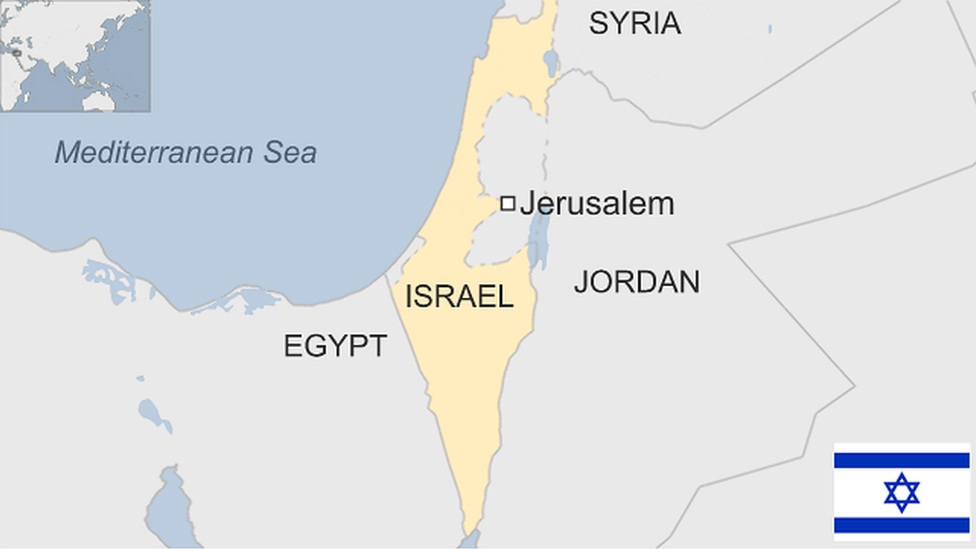Israel election: Will outcome revive peace process?
- Published
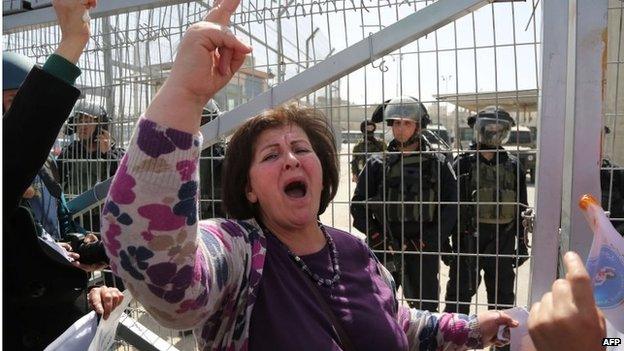
Peace talks between Israel and the Palestinians have been shelved for nearly a year
As electoral drama goes, Israeli election campaigns can be rather a slow burn.
They last for three months, which is long enough to sap the finances of the political parties and the energy of voters, battered by a never-ending string of cheap shots in cheap internet videos.
Campaign 2015 is coming to the boil rather nicely now with the latest opinion polls suggesting that a centre-left alliance is running ahead of the hawkish Likud Party headed by Benjamin Netanyahu.
That does not necessarily mean he will be forced from office - he could still form a right-wing coalition. But election night on 17 March promises to be an exciting affair.
Outsiders, though, might be surprised that the moribund state of the vexed peace process between Israel and the Palestinians has never felt like a major campaign issue.
It is there in the background all the time, of course, as the central historical and strategic issue that his faced this country since the Middle East war of 1967 when it captured Gaza from Egypt and the West Bank from Jordan.
It captured the Golan Heights from Syria too, but that raises a different set of strategic issues which are separate from this particular diplomatic equation.
Economy priority
Voters know that the Zionist Union - the name chosen for the alliance between Yitzhak Herzog's Labour Party and Tzipi Livni's movement Hatnuah - would approach the prospect of talking to the Palestinians about a "land-for-peace" deal with more enthusiasm than Mr Netanyahu.
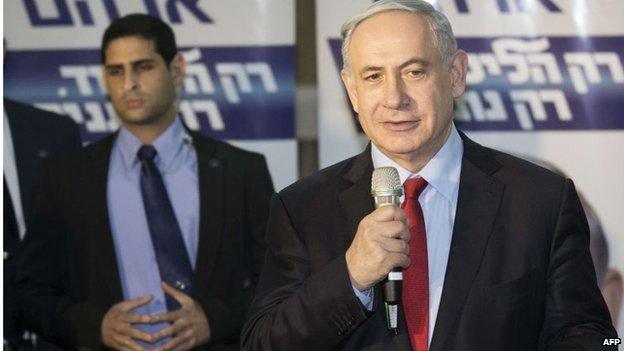
Benjamin Netanyahu says talk of creating a Palestinian state is currently irrelevant
At one point in the campaign there was a brief controversy about whether a speech Mr Netanyahu made six years ago, cautiously embracing the concept of the Two-State solution, was still valid.
His view appears to be that in an unstable Middle East where Iraq and Syria are disintegrating a newly-created Palestinian state could quickly become an ungoverned territory over-run by Islamist extremists.
His many detractors might see in that an excuse for avoiding a deal for which he did not have much enthusiasm in the first place, but part of Mr Netanyahu's pitch to the Israeli people is that he is cautious in such matters - a steady, statesmanlike hand on matters affecting Israel's security.
So while the peace process might be the prism through which outsiders tend to view Israeli politics, this campaign has centred much more on the economy - problems like the way in which the cost of housing outstrips the spending power of ordinary Israelis are front and centre.
And what political scientists call the low-participation rate of the ultra-Orthodox communities in the economy and in the army is a major fault-line between secularists like the Yesh Atid movement and the religious parties like Shas.
No urgency
Yaakov Peri is a former head of Israel's internal security agency the Shin Bet - a job which required him to reflect deeply on his country's relationship with Palestinian society as he bore responsibility for neutralising the threat of militant groups.
Before the last coalition collapsed he was Minister of Science and Technology and this time around he is a candidate once again for the centrist Yesh Atid.
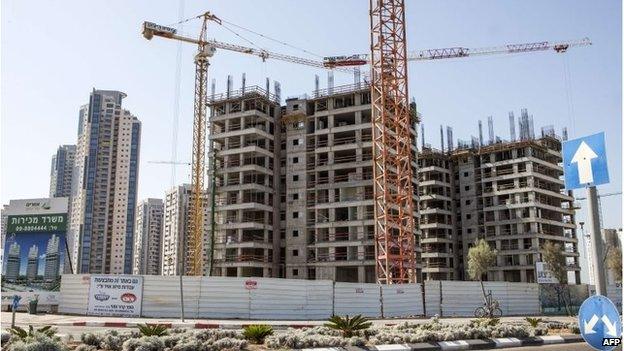
For many Israeli, the cost of living is more of a priority than tackling the Palestinian issue
He says this is an issue where it is up to the government to lead.
"The Israeli public cares about the cost of living and housing and the street doesn't feel the urgency of a deal with the Palestinians or a regional approach," he told me.
"It's a reality and you should look at it when running an election campaign."
You get a sense of the tensions that brought down the last coalition when you discuss the same issues with Naftali Bennett, leader of the nationalist right-wing party Habayit Hayehudi who also sat in the outgoing cabinet.
He has said that there should never be a Palestinian state in the West Bank because to create one would be to create an existential threat to the Jewish State.
"It would," he said, "spell calamity for the future of Israel... handing land over to Palestinians doesn't bring peace, it brings catastrophe... This formula that the West is obsessed with, of land-for-peace simply doesn't work."
Israeli Arab vote
If the right wins the election, Mr Bennett is certain to be back in the cabinet where he would be a sceptical voice against any international diplomatic manoeuvring to get the two sides back to the negotiating table.
The Palestinian people of the West Bank and Gaza of course have no vote in Israel elections - although a small number in East Jerusalem who have applied successfully for Israeli citizenship are an exception to that rule.
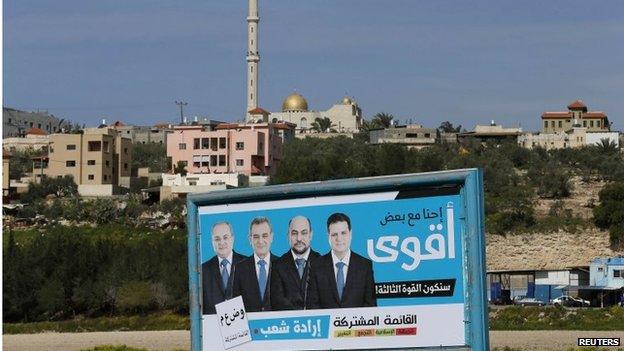
For the first time, Israeli Arab parties have united into a single bloc
But the Arab population of Israel itself - descendants of those who remained after the fighting in Israel's War of Independence in 1948-49 - does have the right to vote.
It makes up about about 15% of the electorate and that proportion will rise as its young people reach voting age.
The three traditional Arab parties have combined into a unified list which is hoping to raise the turnout in that community.
And if they succeed, one of their candidates Aida Touma Suleiman told me, they intend to put the peace process back on the national agenda - not least because they see a clear link between economic and security issues.
"This should be the centre of the campaign," Ms Suleiman said. "There's no issue you can discuss without making a connection to the continuation of the occupation and war policy that different governments have led in the last few years.
"If you want to talk about housing you need solutions that come with resources and then you should ask where the resources are in this country."
Over the course of the campaign, though, those kind of connections have not dominated the national debate here.
How quickly the issue re-asserts itself will depend on whether victory goes to the left or to the right.
- Published12 March 2015

- Published13 October 2023
